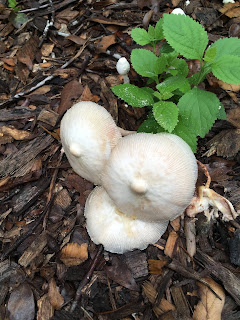Today, we had plans. Pokémon Go plans. Today was Community Day, on which there are an increased number of spawns of the selected Pokémon of the day, with an increased chance of shiny versions (that is, color variations) of that Pokémon. If this means nothing to you, don't worry. What it mainly means is an excuse to get up, get dressed, get out of the house (apartment), and walk around somewhere for three hours, all in pursuit of a digital prize. It's fun.
I woke up this morning and after lounging around in bed for a while, my husband and I decided it was actually time for the day to start. This is a rare luxury, and a very nice one. I started the coffee--Mystic Monk Pumpkin Spice, which is usually something he does, and decided to make something special for breakfast (again, he is often the one who makes breakfast, but not always). So I made biscuits and omelets and we all went through our usual rituals for getting ready--showers, clothing, and the like. I attended to some laundry. Then we piled into the one of our two vehicles that is running well right now--5 people in a VW Golf--for our destination.
First, we decided to visit the small historic downtown of our twin cities. We walked up one street, down another, and back, but had limited success with our goal, so we relocated to the large university campus, which is one of the "hubs" of game activity on these Community Days. (People are very into it!) We walked around for almost 2 hours, then piled back into the Golf for one of our last-chance Pokémon locations--our favorite regional grocery store. The yield overall was satisfying. Afterward, we returned home, dropped off our three children--who had homework, or in one case, just had enough of people for a while (introvert), and headed out again to pick up some pizza from the newest location of our favorite regional grocery store, which has some extra bells and whistles.
Although our younger daughter, the youngest of three, gave me kind of a mortified incredulous look when I called going to the grocery store a "hot date," we arrived in the time frame of a "Happy Hour" at the pizza counter: with every $10 16" pizza, you had the option of having a draft beer. So we did: one Belgian white and one Kölsch. While I chose the former and my husband the latter, we switched after tasting them both, and stood around rather decadently sipping our beers and waiting for our pizzas.
We returned home and ate; my husband washed dishes and I worked some more on clothes, washing a load, drying a load, and folding three or four loads (I'm pretty quick with the folding). We then settled down on the sofa for a bit, rewatching some episodes of the show Lords and Ladles, which we all thoroughly enjoy, while the girls worked (sort of) on some homework. After we had been sitting for a while, not quite dozing, I inquired about possible caffeination and my husband mentioned some work that he had to do--the first week's lesson(s) of a course on copyright. So I made a proposition: Why didn't we go to Starbucks, and he could work on his course and I could work on the paper that I'm supposed to be revising? With the blessing of our oldest, who told us (tongue-in-cheek)that he would be sure to text if he was going to bed before we got home, we did.
While Starbucks was too crowded for us to find a seat, we found plenty of room at a local sandwich-restaurant-and-bakery, and settled down to our respective tasks with some tea and coffee. During one break (ostensibly getting sugar for my tea), I purchased two day-old Challah loaves and a pumpkin bread (even though mine is better), and was given a surprise pastry by the cashier because it was the end of the night (and brought it home to the kids!).
The beautiful thing? I finished comparing the old version and the shorter, revised version of the paper to make sure there was nothing I wanted to add back in (there area few things)--a task that, while not that daunting, had daunted me greatly. In fact, I finished rather quickly and started reading an eBook--Tolkien and the Great War, which I had mainly mined for relevant data previously.
I have realized something about myself after trying to motivate and trick myself into getting back into research. I am self-motivated to a degree, but in order to work on something regularly, long after the thrill of the idea has ceased to carry me forward, when all becomes drudgery and I'm feeling a little down on myself anyway because of this whole no-employment-so-why-am-I-being-scholarly-anyway thing, I need one of three things: A HARD DEADLINE (soft ones don't work), A TANGIBLE MOTIVE, or company. Annnnd... maybe a change of scenery.
So this might become a regular practice, at least for as long as his course lasts (so 8 or 9 weeks). Perhaps on Friday and Saturday, and maybe weekdays (all contingent on my son's work schedule), we may sneak away to do some scholarly activities. It feels a little bit like when we were both in graduate school, and I like it a lot. This feels important. This feels significant. It's not profound, but it is good. It was a good day. And sometimes, a simple, good day is good to write about.





























